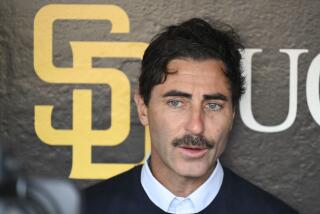N.L. Champion Padres Fill Ship With Ace, Fireman, Utilityman : Jerry Royster : Man of Many Gloves Understands His Role
- Share via
SAN DIEGO — Over the years, the role of the utility player has changed meaning for Jerry Royster.
“Before, I thought a utility player was somebody who barely made the team,” Royster said. “I think the media has made it a good role for me. You’re getting a lot of Jerry Royster-type players now, which most teams like. There aren’t that many guys who can play infield and outfield, especially in the same game.”
Royster, 32, is proof that utility players are made, not born.
He was a third baseman by trade until Bob Horner came to Atlanta in 1978. That triggered an unusual chain of events that molded Royster into a utility player.
In 1979, Royster was Atlanta’s second baseman before Glenn Hubbard took over late in the season. Royster was moved to shortstop, but that did not work out, and he sat on the bench most of the 1980 season.
Royster was mostly an outfielder in 1981 and 1982, but he played other positions as well. He batted .334 as the regular left fielder the last two months of 1982, and Manager Joe Torre called him the team’s most valuable player.
“Joe Torre needed offense in the outfield the second half of 1982, which was my best offensive year,” Royster said. “That’s when I thought I would become a regular again. We won the pennant and I played a big part. I fought to get out of being a utility player, and that’s when I could see the end of my days with the Braves.”
But Royster had signed a five-year contract in 1980.
“The last two years, I practiced getting things down to where I knew what I was doing,” he said. “I didn’t think they would re-sign me. I thought Joe Torre was good about it until last year. I thought last year was really bad because I only played in half of the games. Before that, I knew the situations he would use me in and I knew other teams were watching me.”
Among the teams watching were the Padres. Last week, San Diego signed Royster to a two-year contract worth $700,000 with an option for the third year.
In retrospect, Royster thinks being a utility player has had benefits and disadvantages.
“I thought it cost me financially,” he said. “As far as longevity, it’s the biggest reason I have been able to play as long as I have.”
Manager Dick Williams can relate to Royster.
“Those kind of people are something I thoroughly enjoy,” Williams said. “That’s how I had my longevity. Of course, I was a master of no positions. Jerry is a master of many.”
Royster said Atlanta might not be as good next season as people think, despite the acquisition of free agent Bruce Sutter.
“They were saving games, anyway, with Donnie Moore, Steve Bedrosian and Gene Garber,” Royster said. “Bedrosian was probably one of the best relievers in the league a couple of years ago. Sutter will save every game now, but you have to put runs on the board. If Bob Horner can’t play, they won’t be as good as people think they will without his productivity. Just because they got Bruce Sutter doesn’t mean they will be better.”
Royster, however, defended to a point Pascual Perez, one of San Diego’s worst enemies.
“His antics make him seem like a jerk,” Royster said. “He brings things on himself because of the way he plays the game. A lot of players do the same things he does. If you’re on his team, you see why he does what he does. If he doesn’t do those things, he’s not effective. That’s why he is always jumping around.
“He’s really not a bad guy. Hopefully, I can learn to hit off him now.”
More to Read
Go beyond the scoreboard
Get the latest on L.A.'s teams in the daily Sports Report newsletter.
You may occasionally receive promotional content from the Los Angeles Times.










